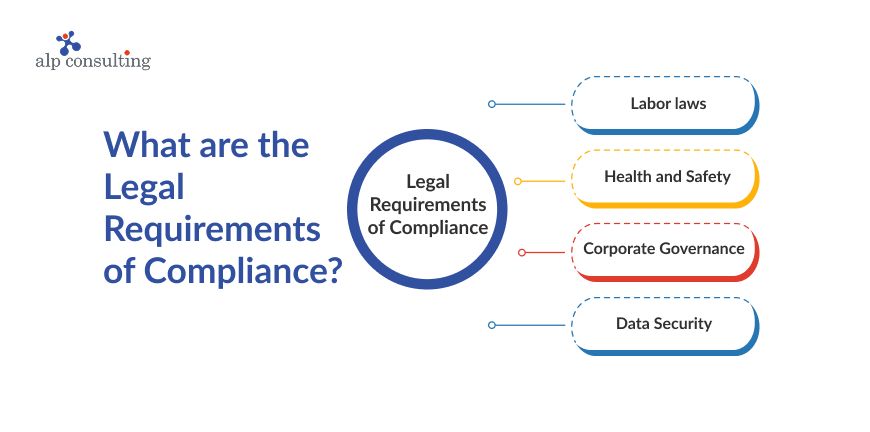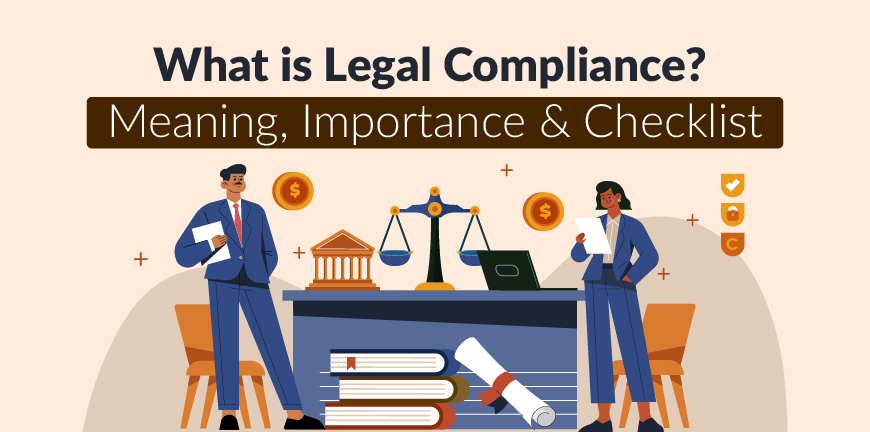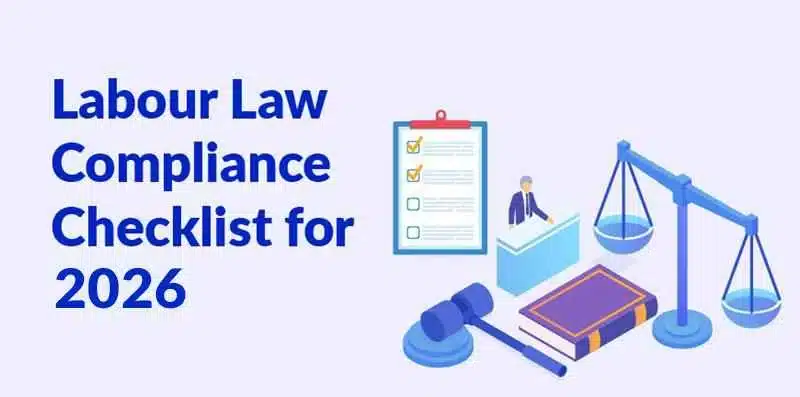
What is Compliance Management? Definition, Importance, Benefits, Process
12/09/2023
Maximizing ROI: The Hire-Train-Deploy Approach
16/09/2023There are several things you need to consider if you want to run a successful business. Taking the time to maintain your legal compliance should be the topmost in your list of priorities. But keep in mind that being legally compliant involves a lot of paperwork and procedures. The best way to handle this would be to have a compliance team in your business dedicated to that particular function.
Being legally compliant with the laws, regulations and standards helps streamline your business. But most importantly it can help you avoid severe penalties and fines. It is the last that businesses need.
What is Legal Compliance?
Legal compliance is the act of a company adhering to laws and policies that are relevant to the sector within which their business falls under. Legal compliance involves ensuring that all actions, practices, and operations are conducted in accordance with applicable local, national, and international laws, as well as industry-specific regulations and internal policies.
Legal compliance meaning
The term legal means “being in accordance with the law” and compliance means “adherence to “.
Legal Compliance is a framework established by the Government for organizations within which companies must work. Staying legally compliant is not just a mandate for companies but can also act as an important aspect in streamlining their business. By having frequent audits of departments, it becomes easier to maintain compliance while staying on top of any changes in the law that can impact them.
Legal compliance is vital and plays a critical role in various aspects of society, business, and governance, as it helps maintain order, protect rights, and promote ethical and responsible behaviour.
What is the Difference between Legal and Compliance?
Most large businesses have both in-house legal and compliance teams. You must know the difference between the two to determine which your business needs.
Some of the key differences between legal and compliance regarding business and regulatory context are-
1. Nature and Scope:
Legal: Legal refers to matters directly related to the law and encompasses legal rights, obligations, contracts, and disputes. It involves dealing with legal issues and the application of laws and regulations to specific situations.
Compliance: Compliance focuses on adhering to all relevant laws, regulations, policies, and standards that apply to an organization’s operations. Compliance includes ethical, industry-specific, and internal requirements.
2. Objective:
Legal: The primary objective of legal matters is to ensure that an organization’s actions are in accordance with the law and to protect its legal rights and interests by resolving disputes and addressing legal liabilities.
Compliance: The main objective of compliance is to ensure that an organization conducts its activities in a lawful, ethical, and responsible manner. It helps in preventing violations and regulatory breaches.
3. Focus:
Here the focus is on specific legal cases, contracts, litigation, and legal rights and responsibilities. A legal team mostly comprises of lawyers who often handle these issues.
Compliance: Compliance encompasses a much larger range of activities that include regulatory reporting, policy enforcement, risk management, and ensuring that all employees and stakeholders adhere to relevant laws and regulations. A compliance team mostly involves compliance officers, management, employees, and sometimes external consultants or auditors.
Areas of potential overlap between the work of a legal and compliance professional but have different objectives. While legal and compliance both deal with matters related to laws and regulations, they differ in their scope, objectives, and approaches. Legal is more focused on specific legal issues and disputes, while compliance encompasses a broader range of activities aimed at ensuring an organization’s adherence to all relevant requirements, both legal and non-legal, to maintain ethical and responsible business practices.
Why is Legal Compliance Important?
As your business keeps growing by the day, the need for compliance, especially legal compliance in HR (Human Resources), becomes more apparent. Your will be responsible for hiring, safety, firing, wages, payroll, and benefits for all of your employees. Here are some key reasons why legal compliance is important:
Avoiding Legal Consequences
Regulatory non-compliance with laws and regulations leads to legal consequences such as fines, penalties, lawsuits, and even criminal charges. You must adhere to the law if you want to avoid negative outcomes.
Protecting Rights and Interests
Legal compliance management ensures that the legal rights are interests of individuals and organizations stays protected. This may include anything and everything from property rights, contractual rights, and the ability to seek legal remedies when necessary.
Maintaining Order and Stability
Laws and regulations provide a framework for maintaining social order and stability. Compliance with these rules helps prevent chaos, disputes, and conflicts in society.
Ethical and Responsible Behaviour
Legal compliance often aligns with ethical and responsible behaviour. Following the law is a fundamental aspect of ethical conduct, and it helps foster trust and integrity in various relationships and transactions.
Company Reputation
Maintaining legal compliance can help elevate a company’s reputation. On the other hand, non-compliance can lead to negative publicity, damage to brand image, and a loss of customer trust.
Access to Markets
Almost all businesses have specific regulations that they need to comply with to gain access to certain markets or industries and compliance is a prerequisite for obtaining licenses, permits, or certifications.
Risk Management
Risk management in legal compliance refers to the adherence to regulations and laws. Companies can minimize legal and financial risks and avoid other risks associated with non-compliance.
International Relations
In the global economy, compliance with international laws and treaties is essential for fostering positive international relations and facilitating trade and cooperation between nations.
Employee Well-being
Complying with labour laws and workplace regulations ensures the well-being of your employees. It promotes fair labour practices, safety, and fair treatment.
Investor Confidence
Compliance with financial regulations and reporting requirements instils confidence in investors and financial markets.
Social Responsibility
Legal compliance is often viewed as a part of an organization’s social responsibility. Companies are expected to not only follow the letter of the law but also contribute positively to society.
Legal compliance checklist in India
A legal regulatory compliance checklist is exactly what it sounds like- a detailed list used to guide in completing a procedure.
Here is a detailed checklist to check if your company’s compliance of labor laws-
| When | Which Compliance | The Act it falls under | To be Submitted to |
| Jan 15Jul 15 | Annual ReturnHalf Yearly return | Factories Act, 1948 | Chief Inspector/ director of the area |
| Jan 21 | Annual Returns | Maternity Benefit Act, 1961 | Designated authority under the Act |
| Jan 30Jul 30 | Half Yearly returnAnnual return
(By Contractor) |
Contract labor (R&A) Act, 1970 & rules | Designated Licensing officer |
| Jan 31 | Annual information on the Establishment | Employees state insurance (ESI) Act, 1948 | Regional office (RO) or Sub.RO or Divisional Office |
| Feb 1 | Annual return | Minimum Wages Act, 1948 | Concerned Authority |
| Feb 15 | Annual return by Principal Employer | Contract labor(R&A) Act, 1970 | Concerned registering officer |
| Every month | As per the provisions of the Act | Employees provident fund & miscellaneous provisions Act, 1952 | Concerned officer |
| – | As per the Act | Equal remuneration Act, 1976 | |
| After 5 years of employees leaving the establishment | Annual returns | Payment of Gratuity Act, 1972 | Concerned labor authority |
| Payment on closure or lay off of employee | – | Industrial disputes Act, 1947 | Concerned Government authority |
| Dec 30 | Annual returns | Payment of Bonus Act, 1965 | Concerned Inspector |
| Dec 30 | Annual returns as prescribed | Sexual Harassment of Women at Workplace Act, 2013 | Employer/District Officer |
| Day of registration of establishment | As per the provisions Act | Trade Unions Act, 1926 | Concerned trade authority officers |
What are the Legal Requirements of Compliance?
The checklist of legal compliance helps in evaluating and checking the company’s performance against legal requirements and identifying areas of need of adherence to compliance. The role of a legal and compliance manager is to ensure that your company complies with its outside regulatory requirements and internal policies. They are responsible for the corporate governance procedures ensuring each department has properly documented control procedures in place and that these are updated appropriately.

The following is a legal compliance audit checklist for companies in general-
Labor laws
- Reviewing of employment contracts, agreements, and policies.
- Ensure compliance with minimum wage laws, labour contracts, and working hours regulations.
- Confirm that workplace safety measures are in place and adhered to as per relevant labour laws.
Health and Safety
This is another critical area of concern when conducting audits in an organization. As businesses are
- subject to various environmental, health and safety laws
- the legal manager can use a checklist to cover all the aspects in order to effectively address all potential risks.
Corporate Governance
- Evaluate corporate governance practices, board meetings, and record-keeping.
- Confirm compliance with corporate governance norms and regulations.
Data Security
- Evaluate data protection and privacy policies and practices.
- Ensure compliance with data protection laws, including data security and breach reporting requirements.
Companies that pay attention to the importance of legal compliance in HR can boost their productivity and gain maximum ROI. How? By maintaining compliance at all levels and stay protected from non-compliance issues. Staying compliant will not just help your business but is a win-win for your employees as well. If you are looking legal and compliance services, contact Alp Consulting today. We will help you steer your business ahead of the competition and boost growth by guiding with all legal compliance issues.
FAQ- Frequently Asked Questions
1. What does legal compliance mean?
Legal compliance refers to the process or state of following and adhering to the laws, regulations, and standards that apply to a particular organization, business, or individual within a specific area. It involves ensuring that your actions, operations, and practices are in accordance with the applicable legal requirements.
2. What is legal compliance certificate?
A legal compliance certificate is a document issued by a legal authority, typically within a government or regulatory agency, to confirm that an organization or individual has met specific legal requirements or obligations. It serves as evidence that the entity in question has complied with applicable laws, regulations, and standards within a particular area or industry. There are various legal compliance documents depending on certain specifications and company requirements.
3. What is the difference between labour laws and legal compliance?
Labor laws are a subset of legal compliance that specifically deal with regulations governing the employer-employee relationship. Legal compliance, on the other hand, involves adhering to all applicable laws and regulations, which may extend beyond labour-related issues to encompass various aspects of legal and regulatory requirements.
4. Legal vs regulatory compliance
Legal compliance is a broader concept encompassing all applicable laws and legal requirements, whereas regulatory compliance is a subset focused on conforming to regulations established by specific regulatory authorities. While there is overlap between the two, regulatory compliance tends to be more industry-specific and involves compliance with rules imposed by government agencies to ensure the proper functioning and oversight of specific sectors.
Contact Us For Business Enquiry

Hariharan Iyer
Hariharan Iyer is the Vice President – Operations at ALP Consulting, bringing over 40+ years of experience in HR outsourcing and labour law compliance. He leads end-to-end HRO operations, ensuring process efficiency, statutory compliance, and seamless service delivery for clients across industries. With a strong background in labour law governance and workforce management, Hariharan plays a key role in driving operational excellence and compliance-led HR solutions at ALP Consulting.





